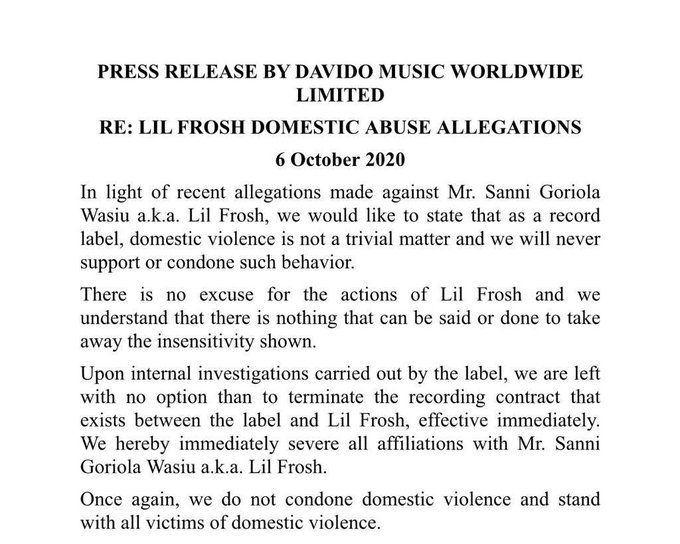One good reason ‘cancel culture’ is non-existent in Nigeria
Even if you tried, you may not remember how many times popular names have been ‘cancelled’ on the Nigerian internet sphere, because it was determined by the forces that be that they erred – or they really erred.
Many of these times, the forgiving forces of the federation will argue that human beings err every day of their lives and we should all have a forgiving heart. At this time, others join the bandwagon saying people are not perfect, so why should they be cancelled.
The cycle continues like that and no one is really cancelled.
Sanni Goriola, known as Lil Frosh, was remanded in Ikoyi prison for allegedly assaulting his girlfriend, Okeoghene Iyomaterie, who is known as Gift Camille. Her brother had reported that she was, on numerous occassions, abused by Lil Frosh.
In October 2020, Mayoks Michael, Camille’s manager and brother, accused Lil Frosh of beating her up. He made the allegation along with images of Camille, injured.
“You have done enough damage for almost a year now you have been in a relationship with my sister and client and you have brought her nothing but horror, pain and disaster,” Michael said on his Instagram page.
This prompted widespread condemnation from prominent celebrities and fans on social media. The whole online social space was lit, and a lot of people had opinions, with others blaming the victim for staying in the relationship.
Even Davido Music Worldwide terminated his contract with him in a statement:

There were other opinions:
Twitter and Instagram filled with people who wanted Lil Frosh to be held accountable. But, it was hardly real.
Because, in December 2020, few months after the abuse case, Lil Frosh released a song, and people were excited, making comments like ‘you are destined to be great.’ And, when he released his EP in January 2022, the excitement reached new heights, with Nigerians like Davido saying, “keep going we dey ur back” with a fire emoji.

Lil Frosh was not really cancelled.
Actually ending someone’s career by calling them out on social media is difficult. There is no record of any Nigerian popular name that has truly been cancelled — that is, while they may have faced considerable negative criticism and calls to be held accountable for their statements and actions.
Lil Frosh’ life is back to normal, and the case has been rested.
He, however, released a giveaway apology when it happened:
Based on the wide range of incidents between I Sanni Goriola Wasiu (Lil Frosh) and Iyomaterie Okeoghene Taiwo (Thacutegemini)
I would like to inform my fans and loved ones that we are on top of the situation, we urge friends and fans of Lil Frosh to be at ease and not to entertain fear or cause forget rancour to this situation.
We would like to state that we condemn violence in all form be it domestic or otherwise, I sincerely apologize for my actions and inaction. Thank you.
Now, it has happened that the case has been taken out of court, and we are all going to forget it ever happened.

What is cancel culture?
“Cancel culture is an extension of or a contemporary evolution of a much bolder set of social processes that we can see in the form of banishment,” Dr Jill McCorkel says. “[They] are designed to reinforce the set of norms.”
Simply put, cancel culture is the idea of taking away support for an individual, their career, popularity and/or fame because of something they’ve said or done that’s considered unacceptable.
Bottomline
Nigerians should stop using the term ‘cancel culture’.





